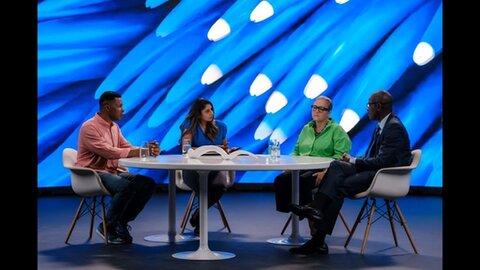voice of change
read time 5min

profile


Watch the Blue Space video
I grew up in a very academic household. My dad was a professor and we were always made aware of climate issues globally. Having been born in 1987, I also grew up with the drought in Ethiopia and the erratic weather in Kenya.
When my sister wanted to go and study medicine in the US, my father was adamant that she should stay and take a course that focused on the environment. She took undergraduate Environmental Science and got me interested in it. I had decided to study Industrial Chemistry and had my heart set on a career in the petroleum industry, because all the people I knew who worked in that field drove the fanciest cars and led lavish lifestyles. There wasn’t yet a well-known connection between the petroleum industry, emissions and climate change.
I read an article in a magazine called Eve, penned by Professor Judi Wakhungu, who later became Kenya’s Cabinet Secretary for the Environment and Natural Resources. She is credited with establishing the ban on the manufacture, importation and distribution of plastic bags in Kenya. The article really inspired me deeply and I saw a lot of myself in her. I wrote her an email and asked if we could meet – and she was kind enough to grant me an appointment. She told me about the world of climate change and science, and how it could influence society, and encouraged me to join a climate activism group at university.
That’s really where my understanding of and passion for climate change began, with a group of young, passionate scientists confronting global climate. It was around the 20th anniversary of the Rio Declaration on climate change. The ball started rolling and picking up momentum, and I found myself fully engaged in that space. After taking a year off after my studies I came back to Kenya and met up with my mentor, who told me about an interview for a job at the Ministry of
the Environment. They were looking for a programme assistant for the UNDP climate change project. I only had six hours to prepare, but because of my background and interest in the topic, I got the job.
When I was embedded at the Ministry of the Environment, managing projects for the UNDP, my first task was to do work on knowledge management. At that time (2012) Kenya had just started picking up on climate change matters and was trying to put strategies together. My day-to-day role was in supporting the government to explore ideas around how traditional knowledge could help people to be able to adapt to climate change better. I was also tasked with putting together a compendium of actors in the country to work on matters of climate change, to make it easier to build a network and to give people opportunities to cross-share.
People think climate change simply means a change in the weather. In reality it’s an existential threat to humanity.
I don’t like doom and gloom. But I do say that humanity’s path of development has really not been friendly to the environment, which means that our future prospects are becoming harder and harder.
I’m generally a positive person and I look to innovators for inspiration. E-mobility, which reduces the use of fossil fuels, is picking up in Kenya. About 92% of Kenya’s electricity is generated by renewables, and the agricultural industry is constantly finding ways to reduce water usage. I look at these innovations and marvel at the human capacity to think and create – and we haven’t yet scratched the surface in terms of how we can change the way we live and do things.
I grew up in a very academic household. My dad was a professor and we were always made aware of climate issues globally. Having been born in 1987, I also grew up with the drought in Ethiopia and the erratic weather in Kenya.
When my sister wanted to go and study medicine in the US, my father was adamant that she should stay and take a course that focused on the environment. She took undergraduate Environmental Science and got me interested in it. I had decided to study Industrial Chemistry and had my heart set on a career in the petroleum industry, because all the people I knew who worked in that field drove the fanciest cars and led lavish lifestyles. There wasn’t yet a well-known connection between the petroleum industry, emissions and climate change.
I read an article in a magazine called Eve, penned by Professor Judi Wakhungu, who later became Kenya’s Cabinet Secretary for the Environment and Natural Resources. She is credited with establishing the ban on the manufacture, importation and distribution of plastic bags in Kenya. The article really inspired me deeply and I saw a lot of myself in her. I wrote her an email and asked if we could meet – and she was kind enough to grant me an appointment. She told me about the world of climate change and science, and how it could influence society, and encouraged me to join a climate activism group at university.
That’s really where my understanding of and passion for climate change began, with a group of young, passionate scientists confronting global climate. It was around the 20th anniversary of the Rio Declaration on climate change. The ball started rolling and picking up momentum, and I found myself fully engaged in that space. After taking a year off after my studies I came back to Kenya and met up with my mentor, who told me about an interview for a job at the Ministry of the Environment. They were looking for a programme assistant for the UNDP climate change project. I only had six hours to prepare, but because of my background and interest in the topic, I got the job.
When I was embedded at the Ministry of the Environment, managing projects for the UNDP, my first task was to do work on knowledge management. At that time (2012) Kenya had just started picking up on climate change matters and was trying to put strategies together. My day-to-day role was in supporting the government to explore ideas around how traditional knowledge could help people to be able to adapt to climate change better. I was also tasked with putting together a compendium of actors in the country to work on matters of climate change, to make it easier to build a network and to give people opportunities to cross-share.
People think climate change simply means a change in the weather. In reality it’s an existential threat to humanity.
I don’t like doom and gloom. But I do say that humanity’s path of development has really not been friendly to the environment, which means that our future prospects are becoming harder and harder.
I’m generally a positive person and I look to innovators for inspiration. E-mobility, which reduces the use of fossil fuels, is picking up in Kenya. About 92% of Kenya’s electricity is generated by renewables, and the agricultural industry is constantly finding ways to reduce water usage. I look at these innovations and marvel at the human capacity to think and create – and we haven’t yet scratched the surface in terms of how we can change the way we live and do things.
The private sector and individuals are doing a lot to drive initiatives to combat climate change. But governments exist to organise society and make declarations that can enable change. The private sector is more agile and has the capacity and ability to shift us to new ways of living and existing, but its success relies on an enabling environment – which the government can establish.
In Kenya we have a thriving clean-cooking sector because the government has offered incentives that have helped it thrive. Without those kinds of declarations and a broader vision, the private sector can only move so far. We have to work hand in hand and take collective responsibility.
Recent weather phenomena around the world have been a wake-up call for people, but scientists have been warning people for decades. We need to make changes. If we don’t, we will perish. We need to make deep changes in the way we do things, how economies are built and the way we interact with the environment – and it needs to happen at scale and in an accelerated manner.
Speed is of the essence. You can see things getting worse quickly in some countries, which means the costs are getting higher and the recovery times are getting longer.
We are seeing more and more the link between climate change and security. Security issues are increasingly emanating from persistent tensions that exist because ofshrinking access to natural resources, which has been exacerbated by climate change. I want people to consider the fact that more climate change will make these resources even harder to come by, which will only make the conflict get worse.
I always get asked how individuals can make a difference. I’ll admit it’s not easy. But climate change has become very loud and more people are seeing effects they can relate to.
I wish people would simply understand that we have established a damaging relationship with nature. It’s showing us up. If we work to restore our relationship with nature to make it more harmonious, it will serve us better – and longer.
See what the weather is doing now and then imagine what it will look like for your kids in a decade or two. I always say we look into our present to try to imagine what the future looks like. If it’s not a good outlook, then we need to do better. I want to do better for my children. It’s what my father saw and he did something that would help his kids be part of the solution.
ILLUSTRATION: HYLTON WARBURTON






